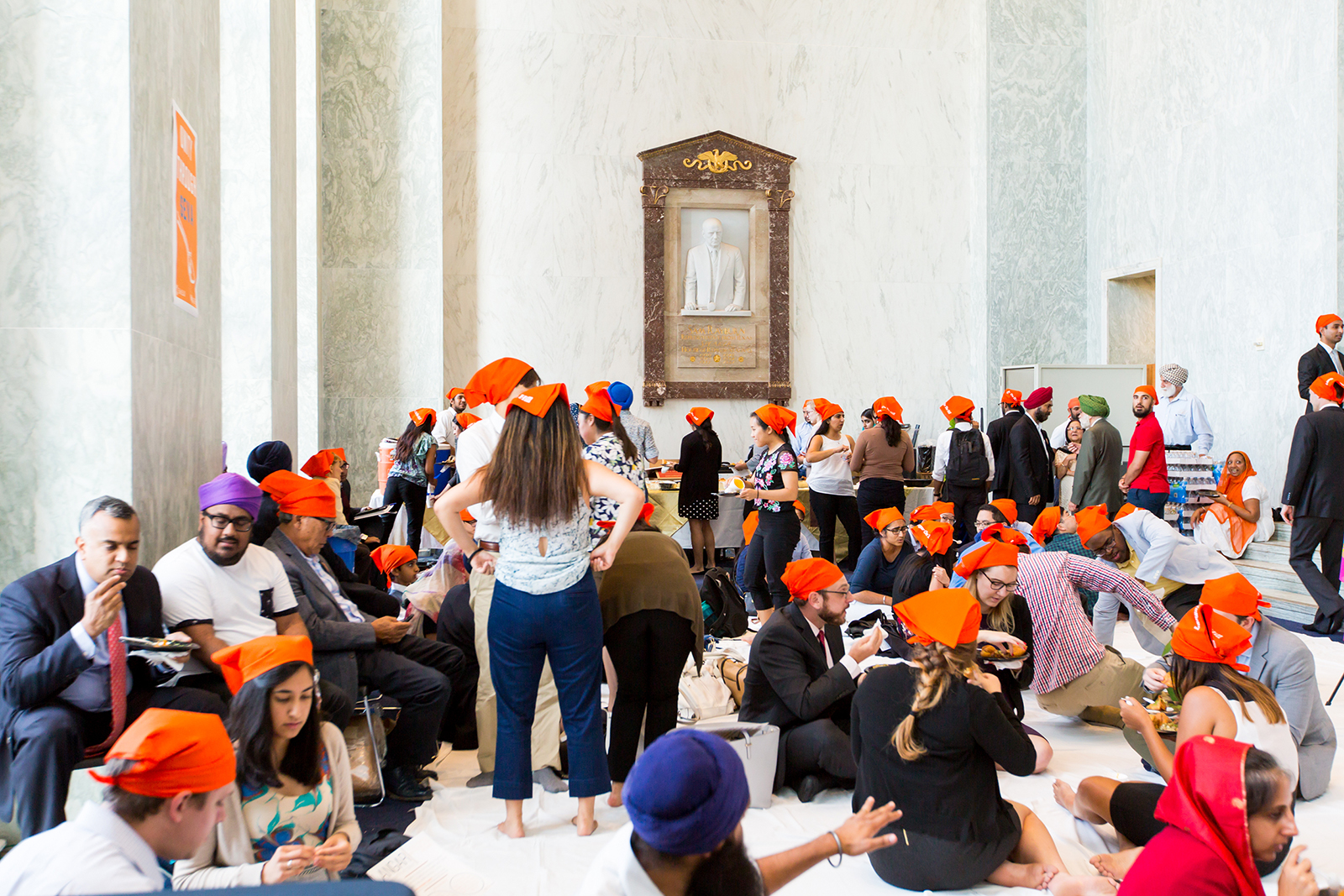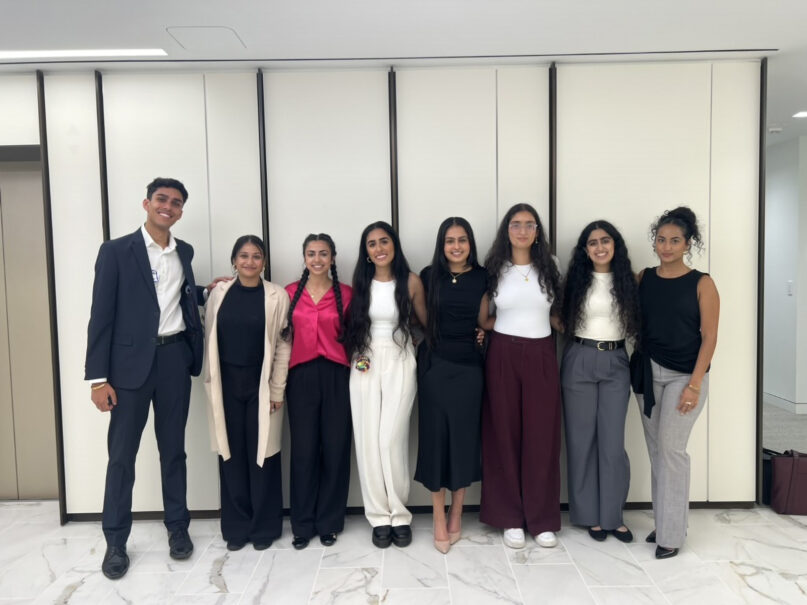
(RNS) — This evening on Capitol Hill (July 9), Congress members, staff, interns and others will experience the Sikh tradition of langar, a free, communal meal prepared by a gurdwara.
The Sikh American Legal Defense and Education Fund’s ninth annual Langar on the Hill aims to build equality, regardless of faith or ethnic background. It also seeks to promote Sikh American visibility at a time when political rhetoric has often been hostile to the religious group and minorities generally.
The langar will be held in person this year — for the first time since it began being hosted virtually during the COVID-19 pandemic. And rather than volunteers serving the vegetarian fare, usually consumed with participants seated next to one another on the floor, the college-age interns of SikhLEAD — SALDEF’s Washington, D.C., internship program — are in charge.
“I think anyone is curious about free food,” said Kiran Kaur Gill, the executive director of SALDEF, the oldest civil rights advocacy organization for the Sikh community in the United States. “Everyone sits together, and they eat a meal together, which is served and prepared by volunteers. And I think it’s a really special way to show how we’re all connected.”
Langar is a 500-year-old anti-segregation movement, said Simar Thind, a 22-year-old policy and programs associate for SALDEF. In the late 15th century, langar was started by Guru Nanak, the founder of Sikhism, as a radical act of equality to reject caste divisions that often prevented Indians from sharing a meal. The nine gurus who followed formalized the practice further, encouraging kings and peasants to sit on the floor together on the same level.
“It’s very much the norm for Sikhs, so I never really stopped to think about it until a few years ago,” Thind said. “But this practice actually is so beautiful, and it is so powerful. It’s a method of quiet resistance, resilience and community building. And more than anything, I think community building during this time is so necessary.”
This year’s Langar on the Hill, advocates said, takes on a special meaning in the face of anti-immigrant and anti-Sikh rhetoric heard from within and around Capitol Hill in the last year. For example, in June, U.S. Rep. Mary Miller, a Republican from Illinois, said in a since-deleted tweet that a Sikh prayer should not have been read on the House floor, incorrectly identifying the reader as Muslim. And last year, Republican politician Harmeet Dhillon was called “blasphemous” on X for reciting an Ardas, or Sikh prayer, at the Republican National Convention.
“As a country, we’re struggling with this question of who belongs,” Gill said. “It’s certainly a conversation about the role of immigrants in this country, the role of diverse communities.”
But langar, as a representation of the Sikh value of sarbat da bhala, or welfare for all, is a way to combat bigotry, Gill said.
“To be able to have this event on Capitol Hill and really take up space in a way where it’s inclusive of all communities I think really speaks to what so many of us believe we can strive for as a country — where we can work together, where we can sit together, where we can take care of one another and benefit all. That’s really what this moment symbolizes,” Gill said.
Thind, who is originally from Long Island, New York, said “physically taking up space as a Sikh in the halls of the Capitol” is as meaningful as ever. Previously a SikhLEAD intern, Thind worked with the eight current student interns to invite congressional representatives who have large Sikh constituencies, such as Grace Meng, a New York Democrat, and Judy Chu, a California Democrat, as well as representatives from less religiously diverse areas of the U.S.

The 2025 SikhLEAD DC cohort. (Photo courtesy SALDEF)
“I think it’s critical to remind members of Congress that Sikh Americans often hold a large population, so their voice actually does matter,” Thind said. “It’s unfortunate that in this day and age, we still see legislators who wield immense power be unwelcoming and hostile and spreading xenophobic rhetoric that makes it seem like religious minority groups are not welcome in the halls of power. We need to remind them that we’re here. We have these issues, and we demand that they be heard.”
Intern Jasleen Kaur, 20, said she grew up seeing Sikh representation in public policy. A Wisconsin native, Kaur was 8 years old when a CNN screen blared the news of a mass shooting at a gurdwara in Oak Creek, Wisconsin, on Aug. 5, 2012, which killed seven Sikhs. At the time, the gurdwara was preparing the langar meal for later that day.
“I thought, ‘That’s 30 minutes away from me, and that’s my people, my family,'” she said. “And that definitely did shake me to my core.”
Kaur’s parents became involved in Sikh outreach after the attack — “making sure others were aware of how Sikhs look, what our values are and how we genuinely practice our faith through pure love,” she said. Through it, Kaur’s desire to combine her faith with advocacy was ignited, and in high school she joined SikhLEAD’s regional internship program — a pivotal moment that introduced her to mentors who exemplified their faith in the public eye, she said.
“A lot of Sikhi is very focused on justice and living in this boundless optimism we call Chardi Kala, and just living for the sake of creating a better environment for all of humanity,” she said. “We are very proud to be Sikh Americans who are actively engaged in public service, and we are super committed to building a more inclusive and just America. We really want everyone to remain in high spirits, even in times of tension, and we really hope for the well-being of all.”
Kaur is finishing up a degree in political science, with a minor in criminology, from Marquette University in Milwaukee and eventually plans to fulfill her middle school dream of becoming a lawyer.
“Then after law school, we’ll see, but maybe someday you’ll see me as a politician on Capitol Hill as well,” she said. “Who knows?”
